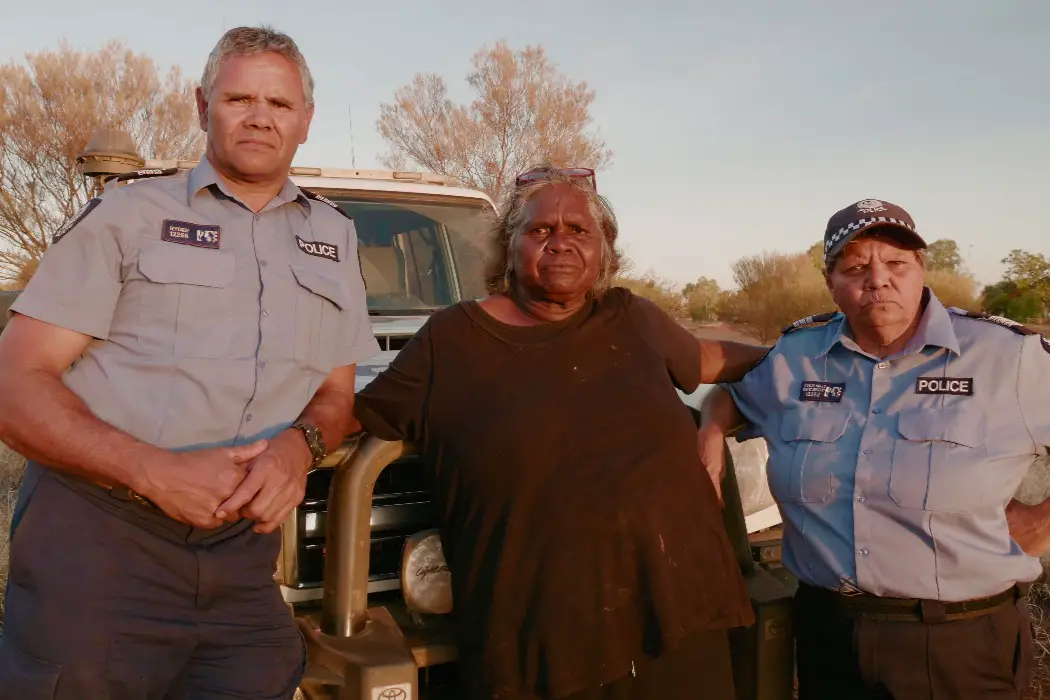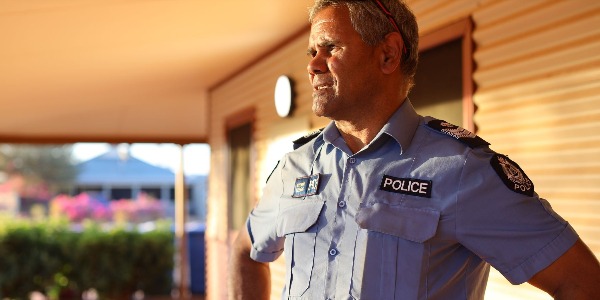Sydney Film Festival 2020: OUR LAW

Alex is a 28 year-old West Australian who has a…
Just under a week after the massive eruption of Black Lives Matters protests that enveloped every end of Australia’s coasts – the crucial ripples of the on-going worldwide fallout resulting from George Floyd’s tragic murder in the United States – Cornel Ozies’ prescient and perceptive documentary Our Law is having its world premiere at the digital edition of this year’s Sydney Film Festival, where it is a finalist for the Festival’s Documentary Australia Foundation Award.
This intimately ethnographic social portrait begins in the isolated Indigenous community of Warakurna, which holds the first-ever all-Indigenous run Police Station in Western Australia, regarded by the WA Police Force as a first step towards rectifying a troubled past between the police and remote Indigenous communities.
The Remote Beat
When we first meet the two officers-in-charge, Senior Sergeant Revis Ryder and his partner Sergeant Wendy Kelly, they’re in the midst of studying what will be their greatest asset towards reconciliation; learning, and understanding the local lore and the Ngaanyatjarra language. The notion of respect and listening to the local populace is the needle which threads itself throughout the various phases of these budding partner’s respective days, all of which are carefully captured by the sincere eye of Sam Bodhi Field, whose striking blend of cozy close-ups and panoramic wide-shots deliver a scenic spectacle of what Warakurna has to offer.

Beautifully observed, Ozies’ succinct snapshot of the pair’s daily lives aptly touches upon the distinct chapters of their remote beat in a surprisingly unsensational manner, whether it be Ryder’s WAFL past being revived through his football coaching work over the weekends, the community paying respects to the families of two people who were recently killed in a devastating road accident or trying to find a missing mother who acted up at the local school and ran away, with each of these brief episodes punctuated by the officers continued efforts to learn the local traditions.
The choice to arrest offenders is often deferred in the interest of compassion, defining a model which the Sergeants hope will pave the way for many more Indigenous-run police stations across Western Australia in the future. Delivered within a succinct 26 minute running time, Our Law elegantly plants the seeds that will allow its audience to meditate and aspire towards a more confident outlook for the tensions between the police and remote Indigenous communities.
Particularly in the context of the Australian film and television culture, Our Law, alongside other recent hits such as Mystery Road and the web series KGB (also produced by Our Law’s Taryne Laffar) have progressed the displacement of the dominant ideology of authority figures – police officers primarily – being portrayed by white Australians, with most classic texts usually sidelining Indigenous voices and perspectives from the drama. As more of these doors are being opened (despite a Government that aims to close them), it speaks for an exciting new direction for the Australian film industry.
Conclusion: Our Law
As Cornel Ozies’ classically humanistic Our Law comes to a close, just as Sergeant Wendy Kelly prepares for a transfer to Kalgoorlie to help spread their effective method of engagement, she notes that “Quite often things are said, but that’s it – they’re said, no actions are done,” and by the intense backlash we’ve seen from around the globe in these past weeks, there are a plethora of people who’ve totally agreed with her.
Our Law is set to premiere on NITV as part of Karla Grant Presents at 8.30pm on Monday 22 June 2020.
Does content like this matter to you?
Become a Member and support film journalism. Unlock access to all of Film Inquiry`s great articles. Join a community of like-minded readers who are passionate about cinema - get access to our private members Network, give back to independent filmmakers, and more.













